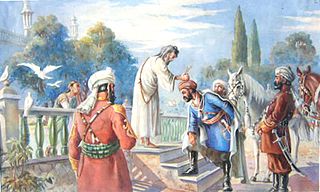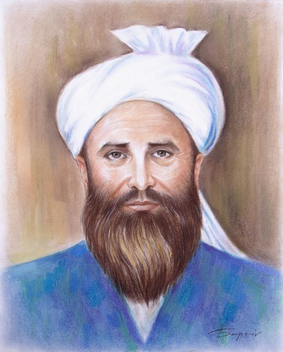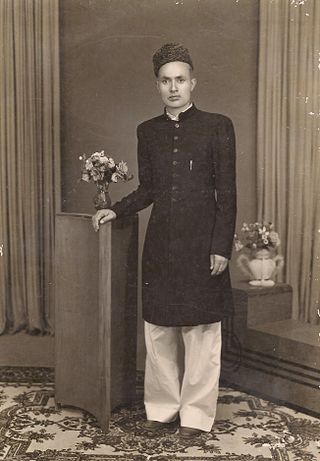
Pashtuns, also known as Pakhtuns, or Pathans, are a nomadic, pastoral, Eastern Iranic ethnic group primarily residing in northwestern Pakistan and southern and eastern Afghanistan. They historically were also referred to as Afghans until the ratification of the 1964 Constitution of Afghanistan, which stated anyone with citizenship is Afghan, and the 1970s after the term's meaning had become a demonym for members of all ethnic groups in Afghanistan.

Pashtunistan is a region located on the Iranian Plateau, inhabited by the indigenous Pashtun people of southern Afghanistan and northwestern Pakistan, wherein Pashtun culture, the Pashto language, and Pashtun identity have been based. Alternative names historically used for the region include Pashtūnkhwā (پښتونخوا), Pakhtūnistān, Pathānistān, or simply the Pashtun Belt.
The Yusufzai or Yousafzai, also referred to as the Esapzai, or Yusufzai Afghans historically, are one of the largest tribes of Pashtuns. They are natively based in the northern part of Khyber Pakhtunkhwa, to which they migrated from Kabul during the 16th century, but they are also present in parts of Afghanistan, including Kunar, Kabul, Kandahar and Farah. Outside of these countries, they can be found in Ghoriwala District Bannu, Balochistan Sibi (Akazai), Chagai (Hassanzai) and Rohilkandh.

The Bangash, Bungish, Bangaš or Bangakh are a tribe of Pashtuns, inhabiting their traditional homeland, the Bangash district which stretches from Kohat to Tall in Hangu and Spīn Ghar, Kurram in Khyber Pakhtunkhwa, Pakistan. They also live as a smaller population in Dera Ismail Khel, Bannu while also a smaller population of Bangash inhabit mainly Gardez, Paktia and around the Lōya Paktia region of Afghanistan.

The Durrānī, formerly known as Abdālī (ابدالي), are one of the largest tribes of Pashtuns. Their traditional homeland is in southern Afghanistan, straddling into Toba Achakzai in Balochistan, Pakistan, but they are also settled in other parts of Afghanistan and parts of Khyber Pakhtunkhwa.

Khan Abdul Ghani Khan was a Pashtun Pashto language philosopher, poet, artist, writer and politician. He was a son of Abdul Ghaffar Khan, a prominent British Raj-era independence activist. Throughout his life as a poet in both British India and Pakistan, Khan was known by the titles Lewanay Pālsapay and Da īlam Samander.

Swabi District is a district in the Mardan Division of the Khyber Pakhtunkhwa province in Pakistan. It lies between the Indus and Kabul Rivers. Before becoming a district in 1988, it was a tehsil within the Mardan District. 96% of the population speaks Pashto as their first language.
Khan is a surname of Turko-Mongol origin, today most commonly found in parts of India, Pakistan, Afghanistan, Bangladesh, Uzbekistan and Iran. It is derived from the historic title khan, referring to military chief or royalty. It originated as a hereditary title among nomadic tribes in the Central and Eastern Eurasian Steppe during antiquity and was popularized by Afghan dynasties in the rest of Asia as well as in Eastern Europe during the medieval period.

Bāyazīd Khān Ansārī, commonly known as Pīr Rōshān or Pīr Rōkhān, was an Ormur Pashtun warrior, Sufi poet and revolutionary leader. He wrote mostly in Pashto, but also in Persian, Hindustani and Arabic. His mother tongue was Ormuri. He is known for founding the Roshani movement, which gained many followers in present-day Pakistan and Afghanistan, and produced numerous Pashto poets and writers.

The Pashto media includes Pashto literature, Pashto-language newspapers, magazines, television and radio stations, as well as Pashto films and Pashto internet. Pashto media involves the Pashtuns of Pakistan, Afghanistan and the Pashtun diaspora around the world.
ʻAbd al-Ghaffār is a male Muslim given name, and, in modern usage, surname, built from the Arabic words ʻabd and al-Ghaffār, one of the names of God in the Qur'an, which give rise to the Muslim theophoric names.

Pashto literature refers to literature and poetry in Pashto language. The history of Pashto literature spreads over five thousands years having its roots in the oral tradition of Tappa. However, the first recorded period begins in 7th century with Amir Kror Suri. Later, Pir Roshan (1526–1574), who founded his own Sufi school of thoughts and began to preach his beliefs. He gave Pashto prose and poetry a new and powerful tone with a rich literary legacy. Khair-ul-Bayan, oft-quoted and bitterly criticized thesis, is most probably the first book on Sufism in Pashto literature. Among his disciples are some of the most distinguished poets, writers, scholars and sufis, like Arzani, Mukhlis, Mirza Khan Ansari, Daulat and Wasil, whose poetic works are well preserved. Akhund Darweza (1533–1615), a popular religious leader and scholar gave a powerful counterblast to Bayazid’s movement in the shape of Makhzanul Islam. He and his disciples have enriched the Pashto language and literature by writing several books of prose.
The Utmankhel is a Pashtun tribe present in Pakistan, with substantial numbers in Afghanistan. They lie between the Mohmands and the Ranizais of Swat, to the west and south-west of the junction of the Swat and Panjkora rivers. The Utmankhel mostly living in Malakand, Bajaur, Mohmand, Lower Dir, Mardan and Orakzai. The Utmankhel are Pashtuns, part of the Karlani tribal confederacy, who fought against British and Mughals emperors in Pakhtunkhwa. The British regarded the Utmankhel tribesmen as “warlike” peoples and one of the Martial Race. The Utmankhel are a tall, stout and fair race, but their dress and general customs have been assimilated by the neighboring peoples of Bajaur. Utmankhel speak the same dialect of Pashtu called Yousafzai Pashto.
Zaida is a village and Union Council in Swabi District of Khyber Pakhtunkhwa, Pakistan. It is located at 34°4'0N 72°28'0E with an altitude of 306 metres.

Shahzada Rehmatullah Khan Durrani was a Pakistan Movement activist born on 10 October 1919 in the Sadozai dynasty of Durrani, the ethnic Pashtun Sadozai tribe, section of the Popalzai sub clan of Durrani Abdali Pashtun tribe in British India, Quetta.

Khan Roshan Khan Yousafzai was a Pashtun historian, educationalist, and writer from Pakistan known primarily for being president of the Muslim League in Swabi and for writing books on the history of the Pashtun people.

Bārakzai is the name of a Pashtun tribe from present-day, Kandahar, Afghanistan. '"Barakzai" is a common name among the Pashtuns and it means "son of Barak" in Pashto. According to the Encyclopædia Iranica, "In the detailed Pashtun genealogies there are no fewer than seven instances of the ethnic name Bārakzī, at very different levels of tribal segmentation. Six of them designate simple lineages within six different tribes located in the Solaymān mountains or adjacent lands... The seventh instance, on the other hand, designates one of the most important Pashtun tribes in numbers and historic role, part of the Zīrak branch of the Dorrānay confederation.
The Muhammadzai are a Pashtun tribe residing in Charsadda, Pakistan.
Pathans in India or simply known as Pathans are citizens or residents of India who are of ethnic Pashtun ancestry. "Pathan" is the local Hindavi term for an individual who belongs to the Pashtun ethnic group, or descends from it. The term additionally finds mention among Western sources, mainly in the colonial-era literature of British India. Historically, the term "Afghan" was also synonymous with the Pathans. The Pathans originate from the Eastern Afghanistan and Northwestern Pakistan regions, ethnolinguistically known as Pashtunistan.











